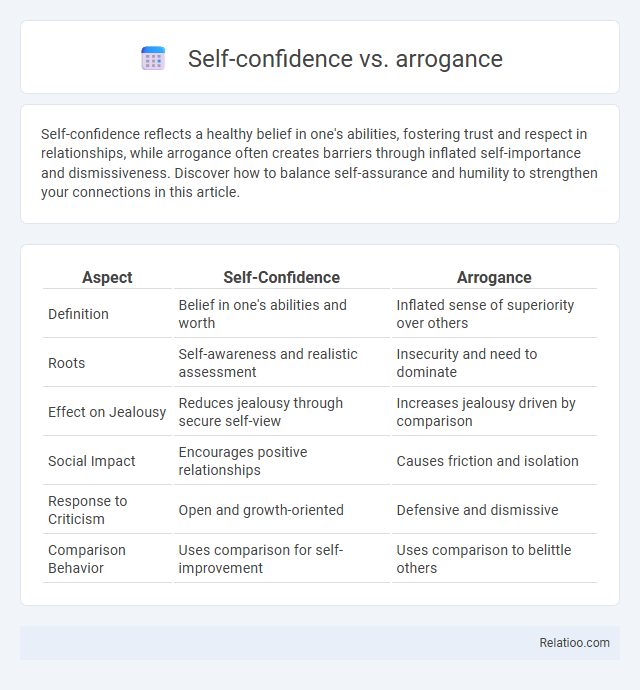Self-confidence reflects a healthy belief in one's abilities, fostering trust and respect in relationships, while arrogance often creates barriers through inflated self-importance and dismissiveness. Discover how to balance self-assurance and humility to strengthen your connections in this article.
Table of Comparison
| Aspect | Self-Confidence | Arrogance |
|---|---|---|
| Definition | Belief in one's abilities and worth | Inflated sense of superiority over others |
| Roots | Self-awareness and realistic assessment | Insecurity and need to dominate |
| Effect on Jealousy | Reduces jealousy through secure self-view | Increases jealousy driven by comparison |
| Social Impact | Encourages positive relationships | Causes friction and isolation |
| Response to Criticism | Open and growth-oriented | Defensive and dismissive |
| Comparison Behavior | Uses comparison for self-improvement | Uses comparison to belittle others |
Understanding Self-Confidence and Arrogance
Self-confidence is a grounded belief in one's abilities and value, promoting resilience and positive interactions, while arrogance stems from an inflated sense of superiority that often alienates others. Understanding self-confidence involves recognizing personal strengths and accepting limitations without diminishing others, whereas arrogance ignores this balance, leading to overestimation and entitlement. Distinguishing these traits is essential for fostering genuine self-worth that inspires respect and meaningful relationships.
Key Traits of Self-Confident Individuals
Self-confident individuals exhibit a strong sense of inner security and self-assurance without the need to belittle others, contrasting sharply with arrogance, which often involves an inflated ego and a lack of empathy. Key traits include resilience, genuine self-respect, and the ability to acknowledge both strengths and weaknesses realistically, demonstrating true worthiness through authentic behavior. You can build lasting relationships and achieve personal growth by embracing self-confidence grounded in honesty rather than arrogance.
Recognizing Signs of Arrogance
Recognizing signs of arrogance involves identifying behaviors such as dismissing others' opinions, displaying excessive self-importance, and an unwillingness to accept feedback or admit mistakes. Unlike self-confidence, arrogance often manifests through a superiority complex and a need to dominate conversations or situations. Understanding these distinctions helps maintain healthy self-worth and fosters respectful interpersonal relationships.
The Psychological Roots of Self-Confidence
Self-confidence originates from a stable sense of self-worth and realistic self-assessment, rooted in psychological factors such as secure attachment, positive reinforcement, and mastery experiences. Unlike arrogance, which stems from insecurity and compensatory defense mechanisms, genuine self-confidence reflects internal validation rather than external approval. Worthiness is a fundamental belief in one's inherent value, serving as the foundation upon which authentic self-confidence is built.
How Arrogance Develops Over Time
Arrogance often develops over time through repeated validation of inflated self-perceptions and dismissing constructive feedback, leading to a distorted sense of superiority. While self-confidence is rooted in genuine competence and self-awareness, arrogance emerges when your achievements create an unbalanced ego that undervalues others' contributions. Understanding the fine line between confidence and arrogance helps you maintain worthiness grounded in respect and humility.
The Impact on Relationships: Confidence vs Arrogance
Self-confidence fosters trust and respect in relationships by promoting genuine communication and empathy, while arrogance often leads to misunderstandings and emotional distance due to a lack of humility. Your self-worth is reflected in how you balance confidence with humility, enabling healthier connections and mutual support. Distinguishing between confidence and arrogance is crucial for building lasting relationships based on authenticity and respect.
Professional Success: Self-Confidence as a Strength
Self-confidence fuels your professional success by enabling decisive actions and effective communication without overshadowing others, distinguishing it clearly from arrogance, which can alienate colleagues and damage reputations. Worthiness encompasses a balanced self-assessment and respect for others' contributions, fostering collaborative environments vital for career growth. Embracing genuine self-confidence empowers leadership qualities and resilience essential in competitive workplaces.
Common Misconceptions About Arrogance
Arrogance is often mistaken for self-confidence, but it lacks the humility and respect that genuine confidence embodies, leading to social alienation and misunderstanding. Common misconceptions portray arrogance as strength or competence, whereas it actually reflects insecurity and a need for validation. Unlike true worthiness, which is grounded in self-respect and the recognition of one's value, arrogance distorts self-perception and damages relationships.
Strategies to Build Authentic Self-Confidence
Developing authentic self-confidence involves setting achievable goals, cultivating self-awareness, and embracing vulnerability to foster genuine self-worth without tipping into arrogance. Reflective practices such as journaling and seeking constructive feedback help individuals differentiate between confidence and entitlement, promoting humility and resilience. Prioritizing self-compassion and continuous personal growth enhances worthiness, enabling a balanced self-perception grounded in true competence and integrity.
Transforming Arrogance into Humility
Transforming arrogance into humility involves recognizing one's strengths without overestimating personal importance, fostering genuine self-confidence rooted in self-awareness. Embracing humility enables individuals to appreciate their worthiness while remaining open to learning and growth, balancing assertiveness with empathy. This shift promotes healthier relationships and a more authentic sense of self, distinguishing confidence from arrogance and cultivating true personal value.

Infographic: Self-confidence vs Arrogance
 relatioo.com
relatioo.com